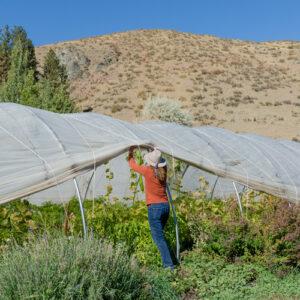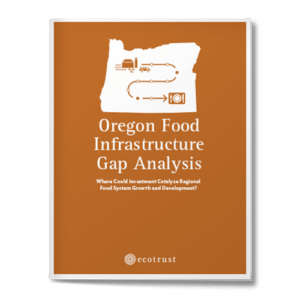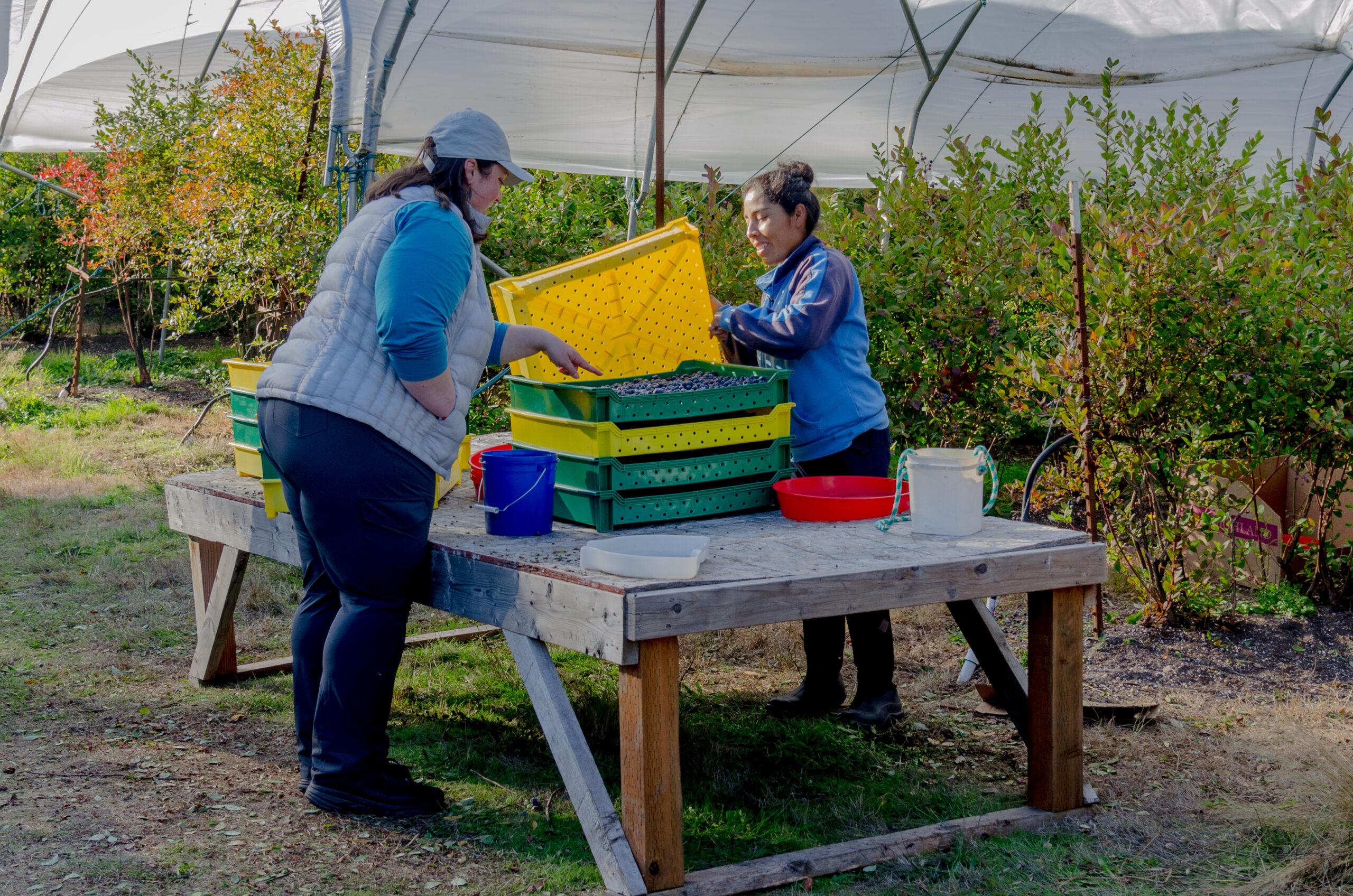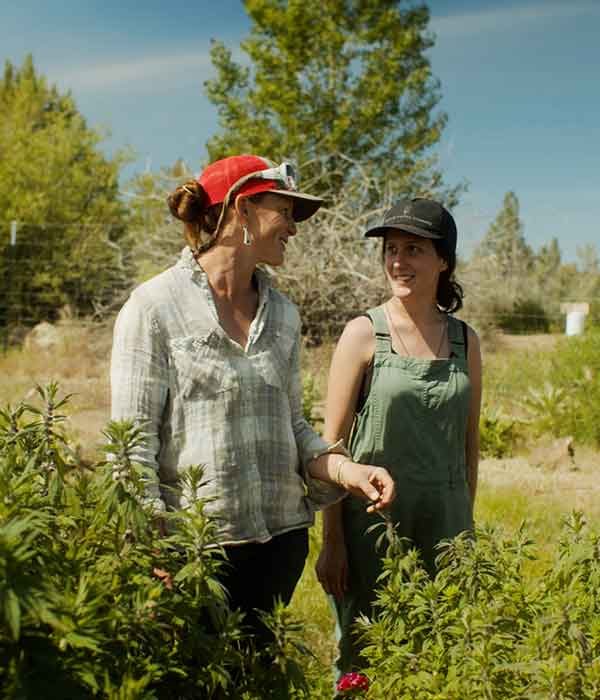
Director of Community Food Systems & Capital

Fisheries & Food Systems Program Manager

Food Equity Manager
Sunset in the almond grove at Massa Organics. Photo credit: Saxon Richardson
Reflecting on successes, challenges, and new opportunities.
Learn more about the impact of this program through our Ag of the Middle Accelerator Program Impact Evaluation
On May 4, 2023, we continued the conversation during a Community Webinar. Watch a recording of our conversation.
Ecotrust’s legacy food system work has long supported the thesis that farmers, ranchers, and value-added producers are critical drivers of democratizing and diversifying food production, rebuilding soil health, improving water quality, and building both economic and social capital in our region. A cornerstone piece of work developed out of that thesis is the Ag of the Middle Accelerator program.
In 2021, our team decided to take a pause and reflect on the program. Together, we had deep and wide-ranging conversations about what was—and what wasn’t—working. And we discussed how the program could be in better alignment with our team’s commitments to centering racial equity and our organization-wide Strategic Plan.
In our reflection, we found a lot to celebrate: Accelerator participants told us they appreciated being part of a network of agricultural businesses facing similar challenges; participants were growing and diversifying their businesses; and attendees were utilizing the trainings offered to increase the chance that their businesses would remain sustainable into the future.

Businesses
Over the course of 5 years, the Ag of the Middle Accelerator program served 65 food and agriculture businesses from across our region, from California to Alaska.

Foundational Research
From 2014-2016, Ecotrust published a series of reports including the Oregon Food Infrastructure Gap Analysis (2015), the Cascadia Foodshed Financing Project (2016), and Organizing to Rebuild Ag of the Middle (2017) that ultimately led to the creation of the Ag of the Middle Accelerator Program.
But we also found concerning cracks in the foundation and structure of the program: the initial research that led to the creation of the Accelerator did not include any considerations for racial equity or how producers who are Black, Indigenous, and people of color (BIPOC) may experience unique and exacerbated challenges that prevent their success and growth. Thus, the design and implementation of the Accelerator led to the program serving mostly white producers (89 percent of total participants).
Through a process of “loving critique,” our team–those primarily responsible for coordinating the Accelerator–grappled with complex questions regarding program impact and implementation, who was benefiting, and how our own identities and experiences shaped our role in the work. After five years of conversations, experiments, and ultimately the realization that co-creation and community-centered program design is critical to building equitable initiatives that result in meaningful impact for BIPOC communities, we decided to sunset the program.

The 2019-20 AOTM Accelerator cohort gathered at an offsite with Ecotrust staff in Washington. Photo credit: Kimber Anderson
While it is challenging to let go of a program into which we have dedicated so much time and energy, sunsetting the Ag of the Middle Accelerator opens up more capacity for collaborative work, both underway and imagined.
As our shared North Star, this is an opportunity to be in closer alignment with our Strategic Plan and build a climate-smart food system that is racially and economically just. The sunsetting of this program does not mean that we aren’t working toward a more resilient regional food system and supporting farmers. We are making clear decisions informed by our Strategic Plan about where to dedicate our team capacity and resources.
And we are carrying forward learnings from this project into future work: In the process of administering the Accelerator, we have built expertise in intensive capacity building, advising on capital and land access, and facilitating conversations about racism in the food system, among others.
We believe that our commitment to being a learning organization comes with a responsibility to share what we have learned. Explore the information in the graphics below, as well as this Program Evaluation, to learn more about our assessment of the Ag of the Middle Accelerator.
Attempted pivots
As Ecotrust’s commitment to racial equity deepened and our team’s skills in utilizing a racial equity framework in program design grew, we identified ways that the Accelerator could be more accessible to a more diverse producer audience.
Despite the attempts, these changes did not result in the program significantly increasing representation from BIPOC communities. In addition to the disconnect between the Accelerator program goals and outcomes with Ecotrust’s Strategic Plan, it was clear that deeper structural changes were needed: that making the program changes named above were not sufficient in meeting Ecotrust’s mission or Strategic Plan goals.
Our attempted pivots included:
Eliminating our revenue requirement, which required participants to have a minimum $100,000 in annual sales to participate
Changing the focus
Changing our program to be less focused on “scaling up” to reach institutional and wholesale markets (which proved to be challenging to address during a two-year program and a barrier for many participants) and more centered on business health and viability
BIPOC Trainers
Working with trainers who identified as BIPOC and trainers who spoke Spanish.

Developing curriculum
Adding curriculum explicitly focused on food justice and the creation of an anti-racist learning group.

Maura Vasquez of Silva Family Farm, an Accelerator participant, shows Yolimar Rivera Vázquez, Food Equity Manager, a flat of blueberries from the farm. Photo credit: Roland Dahwen
Celebrating impact
In many ways, when measured against its original goals and outcomes, the Ag of the Middle Accelerator was very successful. We recently completed a program evaluation that demonstrated:
percentage of Accelerator participants who grew their sales during the program
percentage of participants who grew their number of employees during the program
percentage of participants who took one or more actions in support of business viability and/or business expansion during the program.

Sarahlee Lawrence of Rainshadow Organics, an Accelerator participant, speaks with Maia Larson, Director of Community Food Systems & Capital. Photo credit: Saxon Richardson
We also know from program evaluation data that the Accelerator created community benefit, both directly and indirectly, specifically:
On May 4, 2023, we invited supporters and those working in the food system to join us for a conversation about the process we undertook to sunset the Ag of the Middle Accelerator during a community webinar.
As a way of holding ourselves accountable to our values and goals as an organization, we are centering transparency in our communication. We are happy to share our experiences and insights from developing and implementing the Accelerator program with organizations who are pursuing similar projects.

Project page
Our business development program designed for small to mid-size food producers

EXECUTIVE SUMMARY
The evaluation is intended to be a discrete activity that utilizes existing documents and information collected throughout the four cohorts of Agriculture of the Middle (AOTM) (2017-2020).